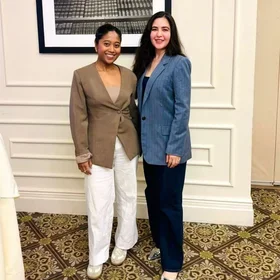By Benjamin Liker ('24SPS, IKNS)
I applied to Columbia’s Information & Knowledge Strategy (IKNS) program in 2022 for four reasons:
- The IKNS curriculum’s unique focus on blending “soft” and “hard” skills.
- I had the flexibility to take up to six courses in other programs at Columbia.
- IKNS’s program director, Dr. Christoph Meinrenken, also chairs the Columbia University Seminar on Complexity Science, Modeling, and Sustainability
- I wanted to live in New York City.
Unlike many students who join the IKNS program after a few years in industry, I matriculated directly after undergrad. In fact, I was only 21 when I took my first classes at Columbia. As such, I had different goals than most. I wanted to get as much out of the program—that is, stuff my head with as much knowledge unique to the institution—as possible.
During my first semester, I took Prof. Ben Royce’s class on artificial intelligence (AI), which captivated my imagination at the same time that AI tools such as ChatGPT and Midjourney were going viral and hitting the mainstream. In addition to taking other core and elective IKNS courses, I was able to expand my scope of learning by enrolling in classes in law, public affairs, sustainability management, and electrical engineering.
Beyond coursework, IKNS is also unique in that it has a Capstone course (where IKNS students consult for F500 businesses) and an option to pursue graduate-level research through an independent study project. For the IKNS Capstone, I was assigned to a team working with a Fortune 500 engineering company, which at the time was going through quite a bit of turmoil. The Columbia team and I learned that a large proportion of the organization was in disarray because of the early retirement of experienced executives, managers, and engineers amid cost-cutting measures.
While we worked on a solution for the company, I was interested in figuring out the root cause of a larger problem plaguing them. When a lot of senior engineers suddenly retired, they didn’t have the opportunity to pass on much of their tacit knowledge to the next generation. Tacit knowledge is acquired through experience—another term for it is “know-how”—while explicit knowledge is crystallized in some format, whether in writing, diagrams, audio, video, or code. With the tacit knowledge possessed by the senior engineers gone, the engineering company had frankly been struggling to manufacture things as well as they have in the past.
Enthralled by this problem, I took my interest in AI and experience from the Capstone course and signed up to dive deeper into this research via an independent study course with Dr. Meinrenken. I wanted to know whether AI could be used to convert tacit knowledge into explicit knowledge. As it turns out, it can’t (yet).
I started independent study by conducting a series of interviews with small-company executives to broadly figure out what the field looked like for AI Knowledge Management tools. After finding a few that seemed to have broad adoption, I classified the different sorts of knowledge work done within companies into three broad categories (Learning, Automation, Analysis), with each having four subcategories. For example, Knowledge Sharing is a subcategory within Learning, and Lead Qualification is a subcategory within Automation. In a practical sense, each of these subcategories typically manifests in a product feature or tool of an AI-KM software suite. I then collected information on hundreds of companies using these tools, breaking down usage by tool type, teams, company size, sector/industry, customer base, and location.
In my post-data-collection analysis, I actually found some pretty interesting information about how AI is being used in these organizations. I uncovered statistically significant data showing that AI (LLMs and other ML-based software) possesses nowhere near human-level abilities and, as a result, is mostly just being used for the lowest-hanging fruit: automating away repetitive, simple “busywork.” Corporations of all types have been quick to realize that AI, in its current form, is just another productivity-boosting technology wave, not the apocalypse-summoning sentient species the media has hyped it up to be – and is thus most useful when complementing existing workers.
That’s right: AI is not going to replace you. You can exhale.
But wait … why the “for now” in the title? My research, and further experience working for an AI company at the cutting edge of the field (a job I found after graduating from IKNS), also indicated that AI was advancing more rapidly in certain areas than in others. Because of the prominence of new methods within machine learning like RAG (retrieval-augmented generation) and Transformers (an ML architecture), venture-funding concentration on application-layer AI companies, and the proliferation of AI “agents” (chat/voice bots that can perform limited functions), it is abundantly clear that there is a clear hierarchy to the jobs that are threatened by AI. First on the chopping block are non-manual-labor jobs that have been outsourced to countries where the cost of labor is cheap: Think call centers. An AI agent today is capable of performing 95% of the work of a human call center employee at one-tenth the cost. As RAGs improve, AI agents will be capable of accessing more specialized knowledge, potentially replacing remote workers in IT, internal support, and operations.
Generally speaking, if a job does not require a high degree of creativity, involve human connection, or have a major physical component, its nature will change significantly over the next five to ten years. The best advice I can give for reducing the probability your job will be disrupted by AI is to work in a field where humanity, ingenuity, and collaboration are a critical part of your job. Ironically, this means that while doctors, lawyers, scientists, artists, and trade workers stand to benefit the most from the AI boom, the very people who created AI—software engineers—may find jobs scarcer as a result of productivity advancements from AI paired with a broad rotation of institutional capital out of the technology sector. As the adage goes, [technology] isn’t going to come for your job, but another person using [technology] might.
After finishing my independent study project in May (here is a link to my research if you’d like to learn more), I graduated from Columbia, but I have since continued my research on how AI will shape the future of work. If you’re interested in keeping up with what I uncover, I post semi-regularly on LinkedIn and Substack.
About the Program
The Columbia University M.S. in Information & Knowledge Strategy (IKNS) degree provides students with foundations in information science, organizational psychology, and change management as well as practical skills in project management and executive leadership.
The STEM-accredited program is available full-time or part-time – online or in- person on Columbia’s landmarked campus right here in New York City. To maximize opportunities for networking and community building, our online students join our New York-based students on Columbia’s campus for three in-person residencies during their studies.
Students train under world-class faculty, including former and current executives from Google, IBM, NASA, and Oliver Wyman, and join a powerful global alumni network in coveted positions, including at Alphabet, Goldman Sachs, Nike, Pfizer, and the World Bank.
For more IKNS insights, news, and events, please go to our website, connect with us on LinkedIn, or attend one of our online info sessions. Visit the School of Professional Studies website to learn more about the SPS student experience.


